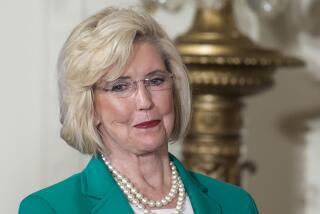Richard A. Graham, 86; pushed for action against sex discrimination and served on first NOW board
- Share via
Richard A. Graham, a founding officer of the National Organization for Women who also played an important role in launching the federal Equal Employment Opportunity Commission, died Monday after a stroke at his home in Royal Oak, Md. He was 86.
In the early 1960s Graham was prominent in what leading feminist and “The Feminine Mystique” author Betty Friedan called the “underground feminist movement” -- a mostly female network in Washington, D.C., whose members promoted women’s issues, often at great risk to their government jobs.
Graham entered public service in 1961 with the Peace Corps as a deputy to its first director, Sargent Shriver.
In 1963 he took his wife and five young children abroad for a two-year stint as the director of the Peace Corps in Tunisia.
In 1965 he returned to Washington as one of President Johnson’s Republican appointees to the newly formed Equal Employment Opportunity Commission.
The commission was created by the historic Civil Rights Act of 1964 to investigate complaints of race and sex discrimination in the workplace. Few people in Washington took sex discrimination seriously, however.
As the commission’s official history notes, it had been added to the legislation as a last-minute ploy by a Southern congressman who opposed civil rights for blacks “and thought that Congress would reject a bill that mandated equal rights for women.”
Members of Congress made jokes about sex discrimination on the House floor, but the act passed -- with Title VII intact -- after a furious lobbying campaign by feminist activists and the public endorsement of Lady Bird Johnson, the president’s wife.
When the commission convened, it was quickly evident that most of the five members were interested only in racial discrimination -- and mainly how it affected black men.
The primary exceptions were Aileen Hernandez, a union activist from California, and Graham.
Friedan met Graham toward the end of his one-year term. In her memoir “Life So Far,” she described him as “a real fighter for women” who was probably not going to be reappointed to the commission “because he took the new law against sex discrimination seriously.” She was right on both counts.
Among the first sex discrimination complaints filed with the commission were many from stewardesses, as flight attendants were called then, who wanted to end airlines’ policies of firing women once they married, got pregnant or reached the age of 35.
Graham pushed the commission to take action on their complaints. He also wanted the commission to oppose sex-segregated job advertising.
The commission’s unwillingness to back women’s issues convinced him, Friedan wrote, “that a new organization was needed to speak on behalf of women. . . . But when he’d gone personally to urge the heads of the League of Women Voters, the AAUW and other women’s organizations with national headquarters in Washington to exert pressure on the Johnson administration to get Title VII enforced, they had been appalled at the very suggestion.”
Graham was among the growing number of activists who, largely motivated by anger at the EEOC’s inaction on sex discrimination cases, began urging Friedan to form a new group, “an NAACP for women.”
“Everybody urged everybody to start NOW,” recalled Hernandez, who became NOW president in 1970.
“Dick definitely was part of those early days, saying, ‘Get yourself organized, get women organized on this issue.’ ”
NOW was founded in Washington in 1966, with Friedan as president and Hernandez as executive vice president. Graham, the only male on the roster, was elected first vice president.
That same year he was named director of the National Teacher Corps, one of Johnson’s Great Society programs that recruited and trained teachers to work in inner-city schools.
From 1975 to 1976 Graham was president of Goddard College in Vermont and helped found the Goddard-Cambridge Center for Social Change, one of the earliest centers for women’s studies.
For the last two decades he worked with the Council for Research in Values and Philosophy, which hosts intercultural exchanges and seminars.
A native of Milwaukee, Graham earned an engineering degree at Cornell University and served in the Army Air Forces during World War II before starting a manufacturing business with his father.
He is survived by his wife of 57 years, Nancy; two daughters, Peggy Sue Graham of Royal Oak, Md., and Nan Graham of New York City; three sons, Charles of Moscow, Idaho, Richard of Laguna Beach and John of Potomac, Md.; a brother, Robert, of Simms, Texas; a sister, Sue Graham Mingus of New York City; 13 grandchildren; and two great-grandchildren.
--
More to Read
Sign up for Essential California
The most important California stories and recommendations in your inbox every morning.
You may occasionally receive promotional content from the Los Angeles Times.














